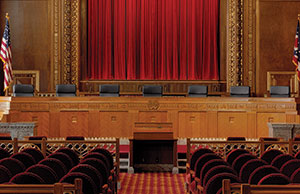Supreme Court to Reconsider Woman's Death Sentence
Among Eight Cases Scheduled for Argument on May 7-8

The Chief Justice and Justices of the Ohio Supreme Court will hear oral arguments in seven cases on April 23 and 24.

The Chief Justice and Justices of the Ohio Supreme Court will hear oral arguments in eight cases on May 7 and 8.
In State v. Roberts, the first of four cases set for argument before the Supreme Court of Ohio on May 7, a Trumbull County woman whose death sentence for the aggravated murder of her ex-husband was remanded to the trial court for resentencing now challenges the reimposition of the death penalty. The defendant, Donna Roberts, alleges among other assignments of error that the trial court committed reversible error by refusing to admit and consider at her resentencing hearing evidence of Roberts’ diagnosed mental illness and brain trauma because she did not offer that evidence in mitigation of a death sentence at her original sentencing hearing.
The court will hear arguments in a total of eight cases on Tuesday May 7 and Wednesday, May 8 at the Thomas J. Moyer Ohio Judicial Center in Columbus.
The court’s Office of Public Information today released summaries of all eight cases.
In addition to Roberts, the cases to be argued on Tuesday include:
- State v. Keck, in which a Marietta man convicted of multiple counts of rape, gross sexual imposition and pandering obscenity involving minor boys asks the court to vacate his convictions on some of those charges based on a claim that the trial court should not have admitted DNA evidence through in-court testimony by one, but not both, of the lab technicians at the state’s Bureau of Criminal Identification (BCI) who conducted DNA testing in his case.
- In In Re D.S., the Cuyahoga County prosecutor’s office seeks reversal of a decision in which the Eighth District Court of Appeals vacated the convictions of a juvenile offender for delinquency counts of murder and felonious assault based on the state’s failure to bring him to trial within the “speedy trial” time limit imposed by Ohio’s Serious Youthful Offender statute.
- In State v. Washington, the court is asked to review a court of appeals decision holding that after prosecutors argued during a defendant’s trial that his flight from police in a stolen car and a subsequent brief attempt to flee on foot were part of the same continuous course of conduct, the state could not later argue at sentencing that the car chase and foot chase were two separate events for which the defendant should receive separate sentences.
The four cases to be argued on May 8 include:
- Scott v. Industrial Commission of Ohio, in which a worker who contracted a disabling lung condition while working in a saw blade factory alleges that the industrial Commission abused its discretion by denying his claim for a specific safety violation against his employer based on the results of a one-day OSHA air quality test that was performed six months after he stopped worked at the factory.
- Esber Beverage Co. v. Labatt USA involves a dispute between a Canton-based beer wholesaler and the U.S. distributor of Labatt beer products over the proper interpretation of language in Ohio’s Alcoholic Beverages Franchise Act. The disputed provision recognizes but limits the right of a beverage manufacturer that takes over a predecessor company to terminate the predecessor’s franchise agreements with Ohio distributors “without just cause.”
- In Longbottom et al. v. Huber, the court is asked to decide whether it is an unconstitutional retroactive application of the law for a court to apply an amended version of the state’s pre-judgment interest statute that was adopted in 2004 to a judgment that was rendered in 2010, but involved injuries that the plaintiff suffered in 2002, while a previous version of the law was in force.
- In Lorain County Bar Association v. Zubaidah, the state’s Board on the Unauthorized Practice of Law has recommended that the Supreme Court impose civil penalties totaling $20,000 against an Elyria man for engaging in the unauthorized practice of law by entering into written agreements to “assist” defendants in four pending criminal cases who were already represented by licensed attorneys. The board found that the respondent, King Ayettey Zubaidah, engaged in unlicensed law practice byoffering his “clients” legal advice, writing letters to judges and attorneys, and otherwise injecting himself into their cases. Zubaidah asserts that he has never held himself out as an attorney or engaged in the practice of law, and asks the court to dismiss the charges against him and order the Lorain County Bar Association to stop interfering with his exercise of his constitutional right of free speech.


